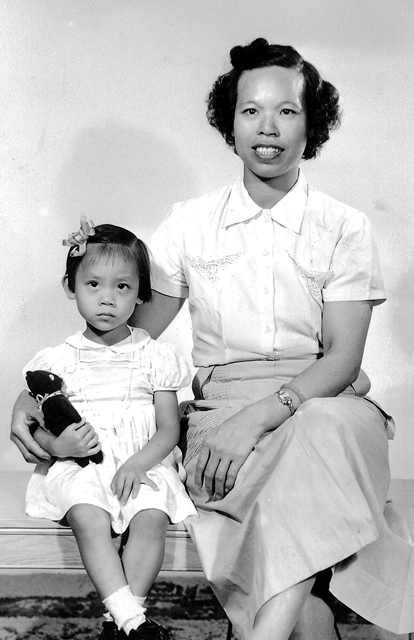Young, Judi Michelle
Judi Michelle Young’s father, Yong Hong Yan, arrived on one of the early shiploads of Chinese men who came to Canada to build the Canadian Pacific Railway (CPR). From the late 1870s to the 1920s, Yong Hong Yan worked for the CPR while making trips to and from China. He married three times: After losing touch with his first wife during a period of separation, Yong Hong Yan married again. When his second wife fell ill in the 1930s, she urged her husband to find another wife. Then in his seventies, Yong Hong Yan returned to China, where he married Yip Won, a servant girl or mui tsai. When war broke out with the Japanese, Yong Hong Yan returned to Canada, but the Chinese Immigration Act prevented Yip Won from joining him. Stranded in China with her in-laws, Yip Won gave birth to a son, who died of starvation. After the war, husband and wife were reunited in China, and Judi was born in 1950 in Yong Hong Yan’s home village, Panyu. After the Chinese Immigration Act was repealed, the family permanently immigrated to Canada in 1951.
Widowed shortly after moving to Canada, Yip Won struggled to make ends meet. She took in sewing jobs, worked in grocery store basements preparing vegetables for display, and also worked in the Great Wall restaurant, where she was the first to introduce the now-popular dim sum dish cheung fun to Toronto, Ontario. She also rented rooms in her home to help offset the costs of owning a house. As the eldest of two girls, Judi acted as her mother’s interpreter and helper. Despite a childhood marked by adult responsibilities and family strife, Judi also recalls happy activities such as her involvement in the church-sponsored Canadian Girls in Training (CGIT). She found creative outlets through school art programs and post-secondary training at the Ontario College of Art. At the time of the interview, Judi was a distinguished sculptor and Co-Director of the Canadian Sculpture Centre in Toronto.
Judi Michelle Young and her mother, Yip Won, sit for a studio portrait in Canada. Judi hopes she has inherited her mother’s ‘obedient hands,’ her way of describing her mother’s perfectionism in creating delicate pastries, sewing, and other handiwork. Yip Won supported her family on less than $500 a year (equivalent to $4,124.11 in 2010, or about one-ninth of the average Canadian family income in the late 1950s). She earned her living from renting rooms in the family house and from making pastries for a local restaurant. Yip Won’s exhausting work schedule and few interactions with Canadians prevented her from learning English.


 /
/ 

